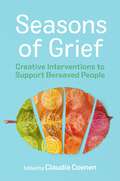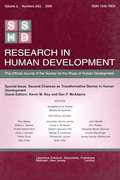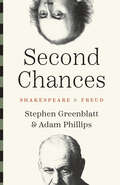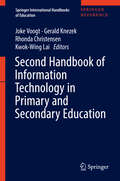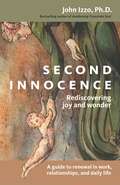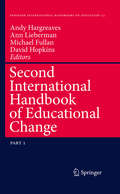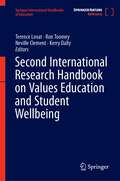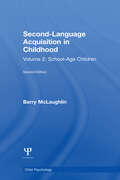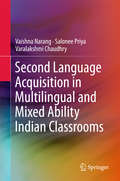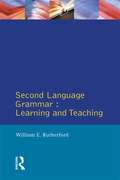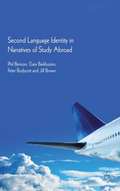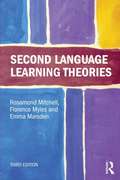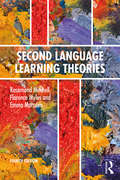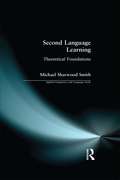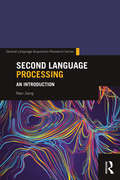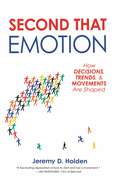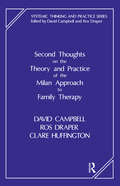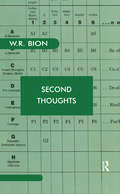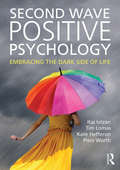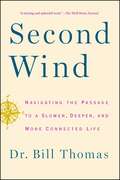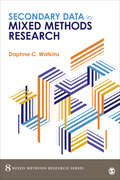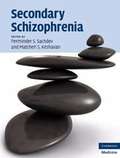- Table View
- List View
Seasons of Grief: Creative Interventions to Support Bereaved People
by Louise Allen Sarah Vollmann Heather Stang Sharon Strouse Oceana Sawyer Dorit Netzer Evie Lindemann Ilana Rowe Yon Walls Robert Neimeyer Deborah Mesibov Elizabeth Coplan Topaz Weis Catharine DeLong Deborah Koff-Chapin Becky Sternal Steven 'Mud' RouesThe quiet letting go of Autumn, the reflective stillness of Winter, the bright rebirth of Spring, and the flourishing warmth of Summer trace the natural path of grief as it grows and changes to fit the spaces left behind by those we love. Easy-to-use exercise guides and activities invite readers to explore the changeable nature of grief through the ebb and flow of the seasons.As well as contributions from diverse creative practitioners, poems from Dr. Robert Neimeyer and reflections from Claudia Coenen create a starting point to delve into the emotional context of each chapter, encouraging the reader to view each personal account and case study through the lens of a different phase of grief. This heart-centred, compassionate approach infuses bereavement therapy with much-needed warmth, supporting clinically-proven techniques to guide users towards practical, healthy ways of processing their loss. Bringing together voices and art from across the spectrum of creative grief therapy, Coenen provides an accessible, compassionate guide to supporting those coping with bereavement throughout their journey.
Second Chances As Transformative Stories Rhd V3 2&3
by Kevin M. Roy and Dan P. McAdamsFirst published in 2006. This is Volume 3 of the Official Journal of the Society for the Study of Human Development from 2006. It includes a special edition collection of articles covering second chances as transformative stories, looking at the redemptive self, emotion and transformational processing, narrating self in the past and the future, low income fathers and prison conversions and the crisis of self-narrative.
Second Chances: Shakespeare and Freud (The Anthony Hecht Lectures in the Humanities Series)
by Stephen Greenblatt Adam PhillipsA powerful exploration of the human capacity for renewal, as seen through Shakespeare and Freud In this fresh investigation, Stephen Greenblatt and Adam Phillips explore how the second chance has been an essential feature of the literary imagination and a promise so central to our existence that we try to reproduce it again and again. Innumerable stories, from the Homeric epics to the New Testament, and from Oedipus Rex to Hamlet, explore the realization or failure of second chances—outcomes that depend on accident, acts of will, or fate. Such stories let us repeatedly rehearse the experience of loss and recovery: to know the joy that comes with a renewal of love and pleasure and to face the pain that comes with realizing that some damage can never be undone. Through a series of illuminating readings, the authors show how Shakespeare was the supreme virtuoso of the second chance and Freud was its supreme interpreter. Both Shakespeare and Freud believed that we can narrate our life stories as tales of transformation, of momentous shifts, constrained by time and place but often still possible. Ranging from The Comedy of Errors to The Winter&’s Tale, and from D. W. Winnicott to Marcel Proust, the authors challenge readers to imagine how, as Phillips writes, &“it is the mending that matters.&”
Second Handbook of Information Technology in Primary and Secondary Education
by Joke Voogt Gerald Knezek Rhonda Christensen Kwok-Wing LaiIn this second edition the editors continue their efforts to synthesize research and practice and project future directions in the field of information and communication technology. The proliferation of mobile devices and applications have had major implications on how the nature of teaching and learning should be conceptualised, and what pedagogical practices should be used to support bridging formal and informal learning. The advent of social media also highlights the importance of gaining a deeper understanding of social learning theories and computer-supported collaborative learning theories and practices. The advancement of new technologies to support easy accessibility of educational resources such as OER and to a lesser extent MOOCs have led to the debate on how assessment should be conducted and how technologies could be used to support it. The demand of the knowledge society requires that researchers, policy makers, and educational practitioners be conversant with new research findings in order to understand the impact of ICT in teaching and learning, and how to support learners to use new technologies and applications creatively and effectively. New research paradigms have emerged to meet these challenges.
Second Innocence: Rediscovering Joy and Wonder
by John B. IzzoA Guide to Renewal in Work, Relationships, and Daily Life. Second Innocence is a book about rediscovering the wonder and joys of life at whatever age we find ourselves. Full of witty and provocative stories, it explores how to renew our life in four realms-daily life, faith, work, and relationships.
Second International Handbook of Educational Change
by David Hopkins Andy Hargreaves Michael Fullan Ann LiebermanThe two volumes of the second edition of the International Handbook of Educational Change comprise a totally new, and updated collection of the most critical and cutting-edge ideas in educational change. Written by the most influential thinkers in the field, these volumes cover educational change at both the theoretical and practical levels. The updated handbook remains connected to the classical concerns of the field, such as educational innovation, reform, and change management, and also offers new insights into educational change that have been brought about by social change and shifting contexts of educational reform. Like the first best selling Handbook, this one will also undoubtedly become an essential resource for people involved in all spheres of education, from classroom teachers, teacher leaders and administrators to educational researchers, curriculum developers, and university professors. No other work provides such a wide-ranging and comprehensive examination of the field of educational change.
Second International Research Handbook on Values Education and Student Wellbeing (Springer International Handbooks of Education)
by Terence Lovat Kerry Dally Neville Clement Ron ToomeyThis collection applies the principles underlying values education to addressing the many social and learning challenges that impinge on education today . Insights in the fields of social and emotional learning, student wellbeing, and, increasingly, educational neuroscience have demonstrated that values education represents an efficacious pedagogy with holistic effects on students across a range of measures, including social, emotional, and intellectual outcomes. With schools in the 21st century confronting issues such as gender identity, stemming radicalism, mental health, equity for disadvantaged groups, bullying, respect, and the meaning of consent, values education offers a way of teaching and learning that integrates and enhances student’s affective and cognitive functioning. The earlier edition of this book has become a standard reference for scholars and practitioners in the fields of values education, moral education, and character education. Its citation rates, reads and downloads have been consistently and enduringly high, as have those of its companion text, Values Pedagogy and Student Achievement. A decade on, the main purpose of the revised edition is to update and incorporate new research and practice relevant to values education. Recent insights in the fields of neuroscience and social and emotional learning and their implications for education and student wellbeing are more overt than they were when the first edition was being compiled. Additionally, advanced thinking in the field of epistemology, how humans come to know and therefore learn, has also sharpened, especially through the later writings of prominent scholars like Jurgen Habermas. The revised edition has preserved the essential spirit and thrust of the original edition while making space for some of these new insights about the potential of values education to establish optimal and harmonious learning and social environments for both students and teachers.
Second Language Acquisition in Childhood: Volume 2: School-age Children (Child Psychology Ser.)
by Barry McLaughlinFirst published in 1987. Throughout human history, learning a second language has been an important part of the educational process. From ancient times to the present, school children have had to struggle to learn a second language (and in many cases third and fourth languages). To be educated meant to know a language other than the language of one's family and community. The contemporary American educational system is one of the few in recorded history that allows its products to remain monolingual.
Second Language Acquisition in Multilingual and Mixed Ability Indian Classrooms
by Vaishna Narang Salonee Priya Varalakshmi ChaudhryThis book discusses current research on learning theories and pedagogical practices in second language acquisition, and tries to bridge the gap between the two. Second language acquisition is perceived as the study of the relationship between input, intake and output in a particular task performance, and Indian classrooms are the context for the research studies in this book. The empirical studies discussed in this book are based on two tasks: seminar speech task (SST) and written test performance task (WTPT). The pedagogical practices discussed cover three specific areas: tasks, skills, and strategies. The study focuses on text input processing for written versus spoken tasks, at various levels of task performance, and for language versus information. The authors discuss, among other issues, various elements of second language speech production, teachers' evaluation of communicative versus form-focused tasks, and task-based versus proficiency-based performance. As a study located in multilingual and mixed ability classrooms, this work provides immense insights to teacher-educators and researchers working in ESL settings with learners from diverse backgrounds.
Second Language Grammar: Learning and Teaching (Applied Linguistics and Language Study)
by William E. RutherfordThe thrust of the book is not so much upon the formation of grammatical constructs but rather upon the shape of the grammatical system and its relation to semantics, discourse and pragmatics.
Second Language Identity in Narratives of Study Abroad
by Et Al. Phil BensonStudy abroad is now both an international industry and an experience that can have a deep impact on students' attitudes and approaches to second language learning. Narratives of Second Language Identity in Study Abroad brings together three important research areas by exploring the impact of study abroad on second language identities through narrative research. It outlines a new model of second language identity that incorporates a range of language and personal competencies. The three main dimensions of this model are explored in chapters that begin with students' study abroad narratives, followed by the authors' in-depth analysis. Further chapters use narratives to assess the impact of programme type and individual difference. Arguing that second language identity development is one of the more important outcomes of study abroad, the book concludes with recommendations on how study abroad programmes can best achieve this outcome.
Second Language Learning Theories
by Rosamond Mitchell Florence Myles Emma MarsdenSecond Language Learning Theories provides a clear and concise overview of the field of second language acquisition (SLA) theories. Written by a team of leading academics working in different SLA specialisms, this book provides expert analysis of the main theories from multiple perspectives to offer a broad and balanced introduction to the topic. The book covers all the main theoretical perspectives currently active in the SLA field and sets them in a broader perspective per chapter, e. g. linguistic, cognitive or sociolinguistic. Each chapter examines how the various theories view language, the learner and the acquisition process. Summaries of key studies and examples of data relating to a variety of languages illustrate the different theoretical perspectives. Each chapter concludes with an evaluative summary of the theories discussed. This third edition has been thoroughly updated to reflect the very latest research in the field of SLA. Key features include: * A fully re-worked chapter on cognitive models of language * A new chapter on information processing, including language production and comprehension * The addition of a glossary of key linguistic terms to help the non-specialist * A new timeline of second language learning theory development. This third edition takes account of the significant developments that have taken place in the field in recent years. Highly active domains in which theoretical and methodological advances have been made are treated in more depth to ensure that this new edition of Second Language Learning Theoriesremains as fresh and relevant as ever.
Second Language Learning Theories: Fourth Edition
by Rosamond Mitchell Florence Myles Emma MarsdenSecond Language Learning Theories is a clear and concise overview of the field of second language acquisition (SLA) theories. Written by a team of leading academics working in different SLA specialisms, this book provides expert analysis of the main theories from multiple perspectives to offer a broad and balanced introduction to the topic. The book covers all the main theoretical perspectives currently active in the SLA field and sets them in a broader perspective per chapter, e.g. linguistic, cognitive or sociolinguistic. Each chapter examines how various theories view language, the learner, and the acquisition process. Summaries of key studies and examples of data relating to a variety of languages illustrate the different theoretical perspectives. Each chapter concludes with an evaluative summary of the theories discussed. This third edition has been thoroughly updated to reflect the very latest research in the field of SLA.
Second Language Learning: Theoretical Foundations (Applied Linguistics and Language Study)
by Michael Sharwood Smith Christopher N. CandlinA survey and analysis of second language theory discusses the development of ideas in this expanding area of language studies. It looks at the implications of these ideas and directions for future research. Contains study questions and activities as well as practical guidelines on the use of available research resources.
Second Language Processing: An Introduction (Second Language Acquisition Research Series)
by Nan JiangSecond Language Processing: An Introduction is the first textbook to offer a thorough introduction to the field of second language processing (SLP). The study of SLP seeks to illuminate the cognitive processes underlying the processing of a non-native language. While current literature tends to focus on one topic or area of research, this textbook aims to bring these different research strands together in a single volume, elucidating their particularities while also demonstrating the relationships between them. The book begins by outlining what is entailed in the study of SLP, how it relates to other fields of study, and some of the main issues shared across its subareas. It then moves into an exploration of the three major areas of current research in the field—phonological processing, lexical processing, and sentence processing. Each chapter provides a broad overview of the topic and covers the major research methods, models, and studies germane to that area of study. Ideal for students and researchers working in this growing field, Second Language Processing will serve as the go-to guide for a complete examination of the major topics of study in SLP.
Second Language Speech
by Colantoni, Laura and Steele, Jeffrey and Escudero, Paola Laura Colantoni Jeffrey Steele Paola EscuderoSecond language acquisition has rapidly grown as a field over the past decade, as our knowledge of the ways in which children and adults learn and use a second language has become crucial for effective language teaching. In addition to this important 'applied' function, research into second language acquisition has also informed the fields of linguistics and psychology in general, as it has shed light on the differences between native and non-native models of human language and cognition. The focus of this accessible new book is second language speech - that is, how speakers perceive, process, understand and pronounce the sounds of a second language. Each chapter includes review questions, and most chapters include 'tutorial' and 'lab' sections with practical exercises based on the University of Toronto Romance Phonetics Database (available online for free). The book also has a companion website, containing illustrated answers to the exercises, scripts for running acoustic analyses and useful weblinks.
Second That Emotion: How Decisions, Trends, & Movements Are Shaped
by Jeremy D. HoldenAn advertising and communications expert traces the fascinating process whereby a passion for an idea, a politician, a celebrity, or a brand gives rise to a set of illogical beliefs that becomes the basis for a powerful movement. Conventional wisdom has it that spin doctors and Madison Avenue are responsible for manipulating our thoughts, causing us to endorse ideas or buy products that we would otherwise reject outright. Holden shows that while advertising and propaganda can provide a spark and social media provides the kindling, individuals create consumer, political, and cultural trends based, more often than not, on thinking that they know logically to be flawed. For businesspeople who want to see their company or brand break through, this book is both essential and entertaining reading. For the rest of us, the author provides a window into our decision-making processes, and how emotion-based illogical leaps drive our support for movements, whether they are political, commercial, or related to popular culture.
Second Thoughts on the Theory and Practice of the Milan Approach to Family Therapy (The Systemic Thinking and Practice Series)
by David Campbell Ros Draper Clare HuffingtonSecond Thoughts on the Theory and Practice of the Milan Approach to Family Therapy is a full discussion of the way the original techniques of the Milan Approach have been affected by current thinking in the family therapy field. Hypothesizing, neutrality and circularity, for example, are all redefined in response to the challenge of new clinical problems, such as child abuse, and new thinking from areas such as linguistics and feminine.
Second Thoughts: Selected Papers on Psychoanalysis
by Wilfred R. BionSecond Thoughts is a collection of papers on Schizophrenia, Linking and Thinking, and is a commentary upon them in the light of later work. Originally composed between 1950 and 1962, it derives its title from the lengthy critical commentary which Bion attached to these case histories in the year of publication, 1967, and represents the evolutionary change of position marked in his three previous books and brought to further refinement in the present work.
Second Wave Positive Psychology: Embracing the Dark Side of Life
by Itai Ivtzan Kate Hefferon Tim Lomas Piers WorthPositive psychology is currently equated with theory and research on the positive aspects of life. The reality could not be further from the truth. Positive psychology investigates and researches some of the most difficult and painful experiences. Second Wave Positive Psychology: Embracing the Dark Side of Life is an innovative and groundbreaking textbook that explores a variety of topics we consider to be part of the ‘dark’ side of life while emphasising their role in our positive functioning and transformation as human beings. This more nuanced approach to the notions of ‘positive’ and ‘negative’ can be described as the ‘second wave' of Positive Psychology. Positive Psychology is one of the fastest growing and least understood branches of psychology. Exploring topics at the heart of Positive Psychology, such as meaning, resilience, human development, mortality, change, suffering, and spirituality, this book engages with so-called ‘negative’ matters from a Positive Psychology angle, showing how the path of personal development can involve experiences which, while challenging, can lead to growth, insight, healing and transformation. ? Containing useful resources, case studies, practical exercises and chapter summaries, Second Wave Positive Psychology is an essential guide for undergraduate and postgraduate students studying positive psychology, as well as clinicians wanting to know more about the subject. It will also be relevant to the layperson who is interested in positive psychology.
Second Wind
by Dr Bill ThomasHow do you know that you are outgrowing adulthood? When you begin to feel that the life you have been living is out of balance; when the need to perform, to hurry, and to acquire is no longer compelling. It's like the moment when your favorite tennis shoes start to give you blisters. The way you've been living your adult life doesn't fulfill you anymore. Dr. Bill Thomas, one of the most innovative thinkers in medicine, explains that a new life phase is beginning to emerge within our society. When the Baby Boom generation came of age in the 1960s and 1970s, they jump-started a cultural revolution that shaped today's society. Now, many feel they are living a life of frenzied disharmony. This out-of-balance feeling is a signal that you are ready for your second coming of age, your life beyond adulthood. Second Wind illuminates how to recognize and navigate the most challenging and fulfilling developmental stage of life. Life can and should be reimagined. New ways of living and working are waiting to be discovered on the far side of adulthood. Dr. Thomas treats the Baby Boom generation as he would one of his patients, sympathetically exploring its history before recommending a path toward a life rich with developmental opportunities. Predicting that Boomers will choose the path of the Denialist, the Realist, or the Enthusiast, he discusses the behaviors and attitudes that will provide new and more nourishing fuel for the rest of life's journey: hope and a renewed sense of all that is possible.
Second and Foreign Language Education
by Stephen May Nelleke Van Deusen-SchollIn this third, fully revised edition, the 10 volume Encyclopedia of Language and Education offers the newest developments, including an entirely new volume of research and scholarly content, essential to the field of language teaching and learning in the age of globalization. In the selection of topics and contributors, the Encyclopedia reflects the depth of disciplinary knowledge, breadth of interdisciplinary perspective, and diversity of socio-geographic experience in the language and education field. Throughout, there is an inclusion of contributions from non-English speaking and non-western parts of the world, providing truly global coverage. Furthermore, the authors have sought to integrate these voices fully into the whole, rather than as special cases or international perspectives in separate sections. The Encyclopedia is a necessary reference set for every university and college library in the world that serves a faculty or school of education, as well as being highly relevant to the fields of applied and socio-linguistics. The publication of this work charts the further deepening and broadening of the field of language and education since the publication of the first edition of the Encyclopedia in 1997 and the second edition in 2008.
Secondary Data in Mixed Methods Research (Mixed Methods Research Series)
by Daphne C. WatkinsSecondary Data in Mixed Methods Research by Daphne C. Watkins, the latest contribution to the Mixed Methods Research Series, offers unique and necessary instruction in this growing topic. With the increasing amount of secondary data available through journals and repositories, researchers have a trove of sources for new investigations at their fingertips, but few books to guide them. This brief text provides readers with a step-by-step procedure for incorporating secondary data into various mixed methods research designs, as well as identifying key characteristics of existing datasets that make them good candidates for mixed methods projects and giving ideas for new uses of secondary data. Introductory chapters help the reader understand the “what” and “why” of secondary data. Subsequent chapters address the use of secondary data in convergent, exploratory sequential, explanatory sequential, and other complex research designs. The final chapters delve into writing and reporting on projects before, during, and after the project. Quotes throughout the chapter help readers remember key bits of knowledge, while learning objectives and summaries in each chapter structure the reading experience. Application questions at the end of each chapter help readers recall information and apply it to their own research projects. By emphasizing how to use existing qualitative and quantitative datasets in mixed methods research, Secondary Data in Mixed Methods Research will help readers answer new and ongoing questions in social science research.
Secondary Data in Mixed Methods Research (Mixed Methods Research Series)
by Daphne C. WatkinsSecondary Data in Mixed Methods Research by Daphne C. Watkins, the latest contribution to the Mixed Methods Research Series, offers unique and necessary instruction in this growing topic. With the increasing amount of secondary data available through journals and repositories, researchers have a trove of sources for new investigations at their fingertips, but few books to guide them. This brief text provides readers with a step-by-step procedure for incorporating secondary data into various mixed methods research designs, as well as identifying key characteristics of existing datasets that make them good candidates for mixed methods projects and giving ideas for new uses of secondary data. Introductory chapters help the reader understand the “what” and “why” of secondary data. Subsequent chapters address the use of secondary data in convergent, exploratory sequential, explanatory sequential, and other complex research designs. The final chapters delve into writing and reporting on projects before, during, and after the project. Quotes throughout the chapter help readers remember key bits of knowledge, while learning objectives and summaries in each chapter structure the reading experience. Application questions at the end of each chapter help readers recall information and apply it to their own research projects. By emphasizing how to use existing qualitative and quantitative datasets in mixed methods research, Secondary Data in Mixed Methods Research will help readers answer new and ongoing questions in social science research.
Secondary Schizophrenia
by Perminder S. Sachdev Matcheri S. KeshavanSchizophrenia may not be a single disease, but the result of a diverse set of related conditions. Modern neuroscience is beginning to reveal some of the genetic and environmental underpinnings of schizophrenia; however, an approach less well travelled is to examine the medical disorders that produce symptoms resembling schizophrenia. This book is the first major attempt to bring together the diseases that produce what has been termed 'secondary schizophrenia'. International experts from diverse backgrounds ask the questions: does this medical disorder, or drug, or condition cause psychosis? If yes, does it resemble schizophrenia? What mechanisms form the basis of this relationship? What implications does this understanding have for aetiology and treatment? The answers are a feast for clinicians and researchers of psychosis and schizophrenia. They mark the next step in trying to meet the most important challenge to modern neuroscience - understanding and conquering this most mysterious of human diseases.
